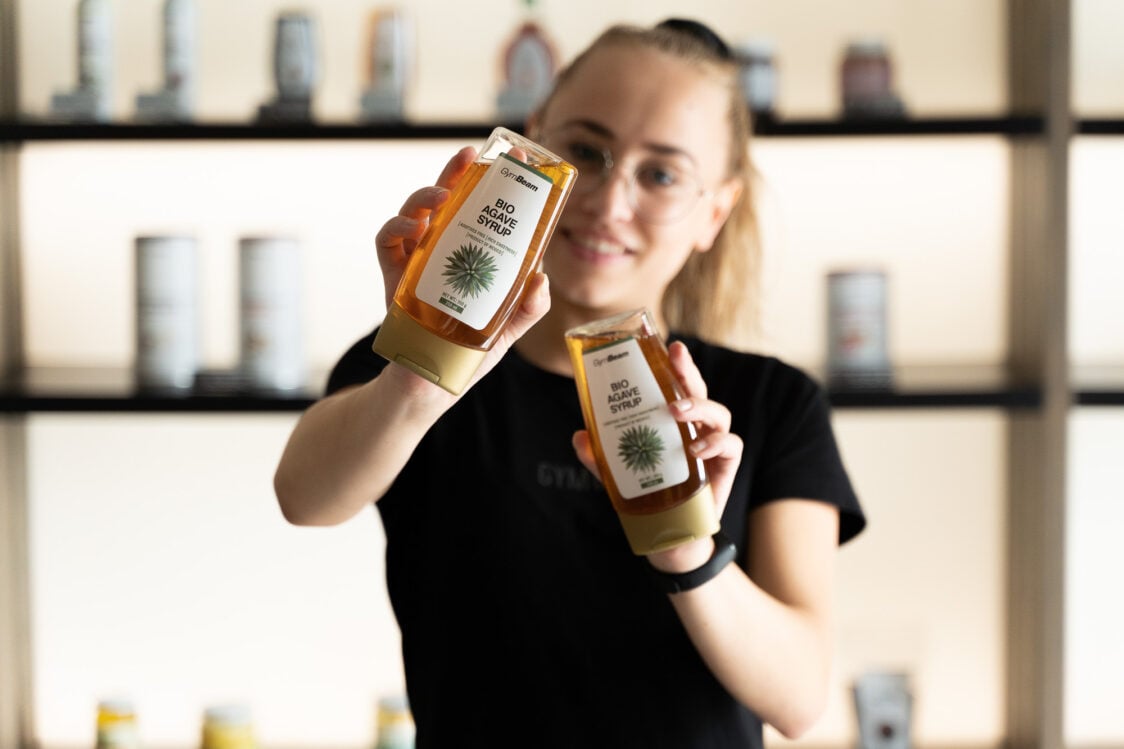Table of Contents
Artificial sweeteners have long been entangled in a web of myths and opinions. Some people avoid them, fearing potential health issues. On the other side, there are people who completely substituted sugar with them and use them in almost everything. What’s the truth about artificial sweeteners and their suitability as sugar substitutes?
In the article, you’ll learn about these artificial sweeteners:
You’ll explore how artificial sweeteners affect:
Why are artificial sweeteners a hot topic?
Everywhere you look, there are food products with added sugar. It hides in sweets, drinks, baked goods, cereals, and flavoured dairy products. That’s why it’s so easy to exceed healthy daily sugar intake limits.
The problem is that excessive sugar intake leads to issues like cavities, overweight, obesity, and associated risks like type 2 diabetes and certain cancers. Reducing sugar intake is very much recommended. Ideally, you should just gradually transition to less sweet flavours, but replacing sugar with alternatives is also an option. Several sugar substitutes are available. [11,18]
What can you use to replace sugar?
Want to enhance a recipe by replacing sugar with one of its alternatives? Or do you just want to sweeten your food without adding any calories? Whichever it is, you have options.
- Natural sugar alternatives: These are essentially different forms of sugar. They differ in taste, aroma, and consistency but offer a similar amount of simple carbohydrates and calories as white sugar. Examples include cane sugar, coconut sugar, honey, maple syrup, and other sweet syrups.
- Natural sweeteners: These options are sugar-free and often have less or zero calories. They include polyols like xylitol and erythritol, and the well-known stevia.
- Artificial sweeteners: These calorie-free options don’t contain any sugar or energy and they’ll be the main focus of this article.
Interested in natural sugar substitutes? Check out our article Sugar Alternatives: What’s Better, Cane Sugar, Honey, Sweet Syrups, or Stevia?

What are artificial sweeteners?
Artificial sweeteners are non-caloric substances that provide a sweet taste without containing sugar or calories. They typically have a higher sweetness level than regular sugar (sucrose), often ranging from a hundred to even a thousand times sweeter. They are commonly used in low-calorie (diet) drinks, sugar-free sweets, chewing gums, and other foods.
How do artificial sweeteners work?
The ability to taste sweetness is facilitated by receptors on taste buds located on the tongue. When molecules of simple sugars bind to these receptors, they send a signal to the brain that you’ve consumed something sweet. The brain processes this signal quickly, allowing you to perceive the pleasant sweet taste on your tongue.
Similarly, molecules of artificial sweeteners can also bind to these receptors. While structurally similar to sugars, they are different enough that the body cannot break them down for energy. As a result, you perceive their sweetness, without them serving as a source of energy. [1,12]
You might be interested in these products:
Are artificial sweeteners safe?
Artificial sweeteners have maintained a reputation as potentially harmful chemicals. Past concerns were fueled by suspicions of negative health effects, such as saccharin being linked to bladder cancer. However, scientific understanding has advanced since then and now we know much more.
Ongoing research continues to unveil new information, sometimes highlighting negative effects of specific sweeteners. Nonetheless, the principle remains that nothing deemed unsafe by the scientific community should be added to foods. Before artificial sweeteners can be used in foods, their health effects must be thoroughly examined and each sweetener must be approved by expert organizations and institutions. In the US, the safety of such additives is assessed by the Food and Drug Administration (FDA), while the European Food Safety Authority (EFSA) holds this role in the European Union and the Food Standards Agency (FSA) in the United Kingdom. In Europe, EFSA-approved foods bear the “E” label. So, the much-feared “E numbers” aren’t dangerous chemicals, but substances rigorously tested and labelled safe for food use. [4]

How much of these sweeteners is safe?
Each sweetener approved by EFSA, FDA or FSA has an acceptable daily intake (ADI), a dose considered safe for daily consumption. Achieving this intake through typical diet is practically unrealistic, and these allowed amounts are often higher than the estimated daily intake (EDI) of each sweetener. Hence, overconsumption is unlikely. [4]
However, like anything, individual situations can make some sweeteners unsuitable. Specific digestive issues or rare metabolic disorders might call for caution. For example, people who suffer from phenylketonuria must avoid aspartame. Nevertheless, within ADI and EDI criteria, artificial sweeteners are considered safe for the general adult population.
Discover our bestsellers:
Known Artificial Sweeteners
Today, the European Union approves ten artificial sweeteners for food use. The most commonly used ones are described below. Often, they are combined in foods, balancing their tastes to resemble natural sweetness as closely as possible. [13]
1. Aspartame
Aspartame (E951) is a dipeptide composed of the amino acids phenylalanine and aspartic acid. These amino acids are naturally present in our diet as components of proteins. However, individuals with phenylketonuria, who cannot metabolize phenylalanine, should avoid it. [8,9]
Aspartame is around 200 times sweeter than sugar. Unlike other sweeteners, it isn’t entirely without energy, but its caloric value (4 kcal/1 g) is so negligible that its consumption from a regular diet is practically impossible. It can be thus classified as a non-caloric sweetener. During its metabolism, methanol is formed, but this is not a dangerous process. Methanol formation also occurs when you eat fruits and vegetables. [9]
Aspartame is not found in baked or heat-processed foods due to its thermal instability which causes it to lose its sweetening capacity. It’s more commonly found in chewing gums, toppings, diet drinks, and other products. [9]
- The acceptable daily intake (ADI) for aspartame is 40 mg/kg body weight (BW). For a person weighing 70 kg, this means they can safely consume up to 2800 mg of aspartame daily.
- The estimated daily intake (EDI) of aspartame is approximately only 14 – 287 mg. [3,14]
2. Acesulfame K
Acesulfame K (E950), also known as Acesulfame Potassium, was accidentally discovered by a chemist who tasted it as part of a mixture he was investigating. Despite being 200 times sweeter than sugar, it’s often used in combination with other sweeteners due to its slightly bitter taste on its own.
It’s commonly found in diet drinks (cola and other non-alcoholic beverages), instant drinks, frozen desserts, and even instant coffee.
It is not metabolized in the body and is excreted unchanged. [8,9]
- The acceptable daily intake (ADI) of acesulfame K is 9 mg/kg BW. Therefore, a person weighing 70 kg can consume up to 630 mg of this sweetener daily.
- The estimated daily intake (EDI) of acesulfame K ranges from 14 to 119 mg. [3,14]
3. Sucralose
Sucralose (E955) is derived from sucrose but is nearly non-metabolized in the body, thus not providing energy. Most of it is excreted unchanged, with only about 2-3% being processed in the body (and subsequently excreted as well). [2]
Its sweetness is even greater than the previous sweeteners, up to 600 times sweeter than sugar. [9]
You might associate sucralose with the brand Splenda, which produces numerous foods sweetened with this sweetener. Sucralose is widely used in the food industry due to its absence of unpleasant aftertastes. It’s found in a wide range of products, from various sweets, diet drinks, gums, and ice creams to baked goods. You can even purchase it in drops to sweeten your yogurt or favourite cereals. It’s also included in various Zero syrups and sauces. [8,9]
- The acceptable daily intake (ADI) of sucralose is 15 mg/kg BW, allowing a 70 kg person to consume up to 1050 mg.
- The estimated daily intake (EDI) of sucralose ranges from 7 to 140 mg daily. [3,14]

4. Saccharin
Saccharin (E954) is the oldest artificial sweetener, discovered by chance similar to acesulfame K. Its sweetness is 300 times higher than sucrose, but it’s often used in combination with other sweeteners to mask its slightly bitter taste. You might recognize it as a sugar substitute for diabetics, available in tablets or drops. [8,9]
Saccharin gained a bad reputation due to past suspicion of its association with bladder cancer. However, this potential negative effect hasn’t been confirmed. The studies were conducted on rodents, and they were exposed to extremely high doses of the sweetener. [8]
- The acceptable daily intake (ADI) of saccharin is 5 mg/kg BW, which is 350 mg for a 70 kg individual.
- The estimated daily intake (EDI) of saccharin ranges from 7 to 140 mg. [14]

5. Cyclamate
Cyclamate (E952) has the lowest sweetness of all sweeteners, being only 30 times sweeter than sucrose. It’s often used in combination with other sweeteners, significantly increasing their overall sweetness. It’s commonly used together with saccharin to create an acceptable sweet taste.
Similar to saccharin, cyclamate was once considered risky in regard to bladder cancer. However, subsequent studies didn’t confirm this, as the original research was conducted on animal models using high doses of cyclamate. [8]
- The acceptable daily intake (ADI) of cyclamate is 7 mg/kg BW, which equals to 490 mg for a 70 kg person.
- The estimated daily intake (EDI) of cyclamate ranges from 28 to 168 mg. [14,17]
7. Neotame
Neotame (E961) is structurally similar to aspartame. It does undergo metabolism in the body, but it doesn’t produce phenylalanine. Unlike aspartame, it’s suitable for individuals with phenylketonuria.
Neotame is 7000 to 13000 times sweeter than sugar, with a taste similar to regular sugar. It’s used in beverages, yogurts, chewing gums, instant foods, and diet drinks. [14]
- The acceptable daily intake (ADI) of neotame is set at 2 mg/kg BW, which is 140 mg for a 70 kg individual.
- The estimated daily intake (EDI) of neotame ranges from approximately 3.5 to 11.9 mg. [3,14]
Overview of Properties of Non-Energetic Sweeteners
| Sweetener | Sweetness | EDI (mg/kg BW) | ||
|---|---|---|---|---|
| Aspartame | E951 | 200 times sweeter than sugar | 40 mg/kg BW | 0.2 – 4.1 mg/kg BW |
| Acesulfame K | E950 | 180 – 200 times sweeter than sugar | 9 mg/kg BW | 0.2 – 1.7 mg/kg BW |
| Sucralose | E955 | 600 times sweeter than sugar | 15 mg/kg BW | 0.1 – 2 mg/kg BW |
| Saccharin | E954 | 300 times sweeter than sugar | 5 mg/kg BW | 0.1 – 2 mg/kg BW |
| Cyclamate | E952 | 30 times sweeter than sugar | 7 mg/kg BW | 0.4 – 2.4 mg/kg BW |
| Neotame | E961 | 7 000 – 13 000 times sweeter than sugar | 2 mg/kg BW | 0.05 – 0.17 mg/kg BW |

What Health Benefits Can Artificial Sweeteners Have?
1. Weight Loss and Weight Management
Excessive sugar intake can contribute to an excess of calories, leading to weight gain. Overweight and obesity are pressing issues in today’s world, making it crucial to find ways to prevent them. Artificial sweeteners appear to be one of these aids due to their potential to reduce sugar intake and thus overall energy intake.
Replacing sugar with artificial sweeteners can help with weight control and weight loss only if their usage leads to reduced energy intake. However, doubts arise about whether these sweeteners are truly the right choice. Some studies suggest that they might lead to increased appetite or reduced sensitivity to sweet taste, which could result in higher calorie intake. The body’s response to artificial sweeteners seems to be individual, and it’s advisable to observe how you react to them and whether they help you with weight loss. [13]

2. Assistance in Blood Sugar Control
Blood sugar (glycemia) levels should be carefully controlled, especially for people with diabetes or impaired glucose tolerance. In both cases, the body struggles to maintain blood sugar levels within a normal range and requires a helping hand.
Ideally, individuals in these situations should restrict sugar consumption to avoid excessive blood sugar spikes.
This is where artificial sweeteners can come to the rescue. Since they do not contain sugar, they do not raise glycemia levels. People who need to limit simple carbohydrates in their diet can continue enjoying their favourite sweet taste. [5]
Even healthy individuals can benefit from controlled blood sugar levels. Blood sugar fluctuations are associated with increased cravings for sweets and changes in your energy levels. More stable glycemia can mitigate these discomforts.
3. Oral Health
It’s a well-known fact now that excessive sugar intake increases the risk of tooth decay. Bacteria in the mouth can produce acids from sugar, which subsequently erode tooth enamel. [7]
Artificial sweeteners, however, do not have this effect, making them safe from a dental perspective. If you were to replace sugar with artificial sweeteners, you could significantly contribute to your oral health. [7]
However, be cautious with diet drinks that commonly use artificial sweeteners. While they don’t contain sugar, they often contain organic acids that can damage tooth enamel.
More about diet drinks, their composition, and their impact on health can be found in the article Diet Drinks: What Impact Do They Have on Health and Can They Help with Weight Loss?
Do Artificial Sweeteners Have Negative Health Effects?
Sweeteners certainly do have drawbacks, and there are several potential negative health effects associated with them. However, research is not perfect even today, and there is still much we don’t know. Additionally, many studies that examine sweeteners are conducted on animal models or involve excessive doses of sweeteners, which limits the conclusions we can draw.
1. Impact on Appetite
As mentioned earlier, regular consumption of artificial sweeteners might play with our appetite. Our appetite is significantly influenced by the brain’s reward system. This system releases dopamine and other similar substances after consuming tasty foods, typically high in sugar and fat, which trigger feelings of happiness. By having, for example, a piece of chocolate, you satisfy that need for an energy boost.
In some studies, researchers suggest that artificial sweeteners, which provide sweetness but not energy, may inadequately stimulate this reward system. Simply put, after consuming some chocolate with sweeteners, the brain might not be satisfied and continues seeking something to stimulate the reward system to the desired level. This could manifest as an increased appetite and a desire for regular chocolate even after trying to “trick” yourself with the one containing sweeteners, which could lead to a higher intake of high-energy foods and potential weight gain. [13]

2. Impact on Gut Microbiota
The impact of foods and various substances on the composition of gut microbiota has become a major topic lately, and artificial sweeteners are no exception. Optimal gut microbiota composition is a crucial aspect of our health and is known to be connected to immunity functioning, cognitive abilities, and even body weight. [6]
For certain sweeteners, studies suggest they could lead to a lower proportion of beneficial bacteria while promoting the growth of harmful ones. Certain bacteria seem to have the ability to metabolize sweeteners, which can directly influence them.
For instance, some studies mention saccharin, which might alter the composition of the microbiota and potentially increase the risk of glucose intolerance. However, other studies did not confirm this effect. Moreover, only about 15% of saccharin comes into contact with gut bacteria, so you would likely need to consume it in massive amounts to get negative effects from it. Aspartame and sucralose were also suspected to have negative impacts on gut bacteria, but one study involving 17 participants concluded that neither of them affected the abundance of microorganisms in the digestive system. Other studies have yielded similar results . [1,10,20]
The potential impact of sweeteners on the gut microbiota is certainly interesting, but it’s also a relatively unexplored field. Uncertainties can arise, such as the fact that many studies are conducted on animals, and these results can’t always be directly applied to humans. According to what we know right now in regards to sweeteners and gut microbiota, if you consume them in moderation, you don’t need to fear negative effects on beneficial gut bacteria. However, this research area is still relatively young, and further scientific work is needed to form a clearer picture. [1]
3. Cancer
As mentioned earlier, some sweeteners were previously associated with a higher risk of cancer. For instance, cyclamate and saccharin were linked to bladder cancer. However, these suspicions were not confirmed in recent studies involving human participants.
Recently, there has been information suggesting that aspartame might be linked to a higher risk of liver cancer. As a result, the World Health Organization (WHO) classified it as a potential carcinogen (Category 2B IARC classification), meaning there is inadequate evidence of its carcinogenicity. It’s worth noting that this classification places it alongside substances like aloe vera extract and pickled vegetables. On the other hand, substances like alcohol and smoking are categorized as proven carcinogens (Group 1). WHO even concluded that, based on the new findings, there’s no need to reduce its acceptable daily intake (previously used mg/kg BW). [15,16]
Should Artificial Sweeteners be Included in Your Diet?
When it comes to reducing the amount of sugar in your diet, the first step should always involve gradually weaning yourself off the sweet taste by reducing sugar intake. However, if you don’t want to eliminate sweetness entirely and would like to replace sugar, artificial sweeteners can be a good option. They can serve as helpful aids, especially when aiming for weight loss. They can even be some of the most suitable sweeteners for diabetics, as long as you choose options that contain no sugar or energy. If you adhere to the intake limits set by professional institutions, they can be considered safe.
Yet, it’s important to acknowledge that each of person might react differently to sweeteners. For instance, the World Health Organization (WHO) recently issued a report based on a study suggesting that artificial sweeteners are not suitable for long-term use when your goals involve weight loss or preventing metabolic disorders. Because they might negatively affect appetite and body weight in some individuals, they might not be ideal in the long run. Thus, it’s always wise to evaluate whether they are the right choice for you and to consume them sensibly within a balanced and varied diet. [19]
Likewise, you shouldn’t be alarmed by the conclusions of studies suggesting a potential increased risk of cardiovascular diseases. Studies often track sweetener intake in diet drinks and similar foods, which are frequently consumed alongside other inappropriate dietary habits. This introduces numerous variables that can contribute to poorer heart and vascular health, potentially distorting the entire issue. [21]

What Should You Remember?
When searching for a sugar substitute, artificial sweeteners present themselves as helpful allies. For example, you can sweeten your coffee with sucralose drops or purchase beverages containing aspartame. Nevertheless, some people might have concerns about their safety. The good news is that these sweeteners are thoroughly monitored by regulatory organizations, and they have established intake limits that are practically impossible to exceed in a regular diet. As a result, they can be considered safe and potentially beneficial companions, especially for weight management. Of course, like with anything, there are discussions about potential negative effects. Therefore, it’s advisable to consume them sensibly and only as a complement to a healthy diet.
Have we clarified the information regarding sweeteners for you? If you found the article interesting, don’t forget to share it with your friends and family.
[1] AHMAD, S.Y. et al. The Effects of Non-Nutritive Artificial Sweeteners, Aspartame and Sucralose, on the Gut Microbiome in Healthy Adults: Secondary Outcomes of a Randomized Double-Blinded Crossover Clinical Trial. – https://www.ncbi.nlm.nih.gov/pmc/articles/PMC7694690/
[2] BERRY, C. et al. Sucralose Non-Carcinogenicity: A Review of the Scientific and Regulatory Rationale. – https://www.ncbi.nlm.nih.gov/pmc/articles/PMC5152540/
[3] FITCH, C. - KEIM, K.S. Position of the Academy of Nutrition and Dietetics: Use of Nutritive and Nonnutritive Sweeteners. – https://www.jandonline.org/article/S2212-2672(12)00325-5/fulltext
[4] FITCH, S.E. et al. Use of acceptable daily intake (ADI) as a health-based benchmark in nutrition research studies that consider the safety of low-calorie sweeteners (LCS): a systematic map. – https://www.ncbi.nlm.nih.gov/pmc/articles/PMC8138992/
[5] GARDNER, C. et al. Nonnutritive Sweeteners: Current Use and Health Perspectives. – https://www.ncbi.nlm.nih.gov/pmc/articles/PMC3402256/
[6] CHEN, Y. et al. Role and Mechanism of Gut Microbiota in Human Disease. – https://www.ncbi.nlm.nih.gov/pmc/articles/PMC8010197/
[7] MANDEL, I.D. - GROTZ, V.L. Dental considerations in sucralose use. – https://pubmed.ncbi.nlm.nih.gov/11887514/
[8] MORTENSEN, A. Sweeteners permitted in the European Union: safety aspects. – https://www.tandfonline.com/doi/full/10.1080/17482970600982719
[9] NUTRITION, C. for F.S. and A. Aspartame and Other Sweeteners in Food. – https://www.fda.gov/food/food-additives-petitions/aspartame-and-other-sweeteners-food
[10] POZO, S. DEL et al. Potential Effects of Sucralose and Saccharin on Gut Microbiota: A Review. – https://www.ncbi.nlm.nih.gov/pmc/articles/PMC9029443/
[11] STANHOPE, K.L. Sugar consumption, metabolic disease and obesity: The state of the controversy. – https://www.tandfonline.com/doi/abs/10.3109/10408363.2015.1084990
[12] SYLVETSKY, A.C. et al. Development of Sweet Taste Perception: Implications for Artificial Sweetener Use. – https://pubmed.ncbi.nlm.nih.gov/28873386/
[13] WILK, K. et al. The Effect of Artificial Sweeteners Use on Sweet Taste Perception and Weight Loss Efficacy: A Review. – https://www.ncbi.nlm.nih.gov/pmc/articles/PMC8954878/
[14] Acceptable daily intake of sweeteners in the EU | Knowledge for policy. – https://knowledge4policy.ec.europa.eu/health-promotion-knowledge-gateway/sugars-sweeteners-7_en
[15] WHO Aspartame hazard and risk assessment results released. – https://www.who.int/news/item/14-07-2023-aspartame-hazard-and-risk-assessment-results-released
[16] List of Classifications – IARC Monographs on the Identification of Carcinogenic Hazards to Humans. – https://monographs.iarc.who.int/list-of-classifications/
[17] International Sweeteners Association - Revised opinion on cyclamic acid and its sodium and calcium salts – https://www.sweeteners.org/scientific_studies/revised-opinion-on-cyclamic-acid-and-its-sodium-and-calcium-salts/
[18] WHO Sugars and dental caries. – https://www.who.int/news-room/fact-sheets/detail/sugars-and-dental-caries
[19] WHO advises not to use non-sugar sweeteners for weight control in newly released guideline. – https://www.who.int/news/item/15-05-2023-who-advises-not-to-use-non-sugar-sweeteners-for-weight-control-in-newly-released-guideline
[20] PLAZA-DIAZ, J. et al. Plausible Biological Interactions of Low- and Non-Calorie Sweeteners with the Intestinal Microbiota: An Update of Recent Studies. – https://www.ncbi.nlm.nih.gov/pmc/articles/PMC7231174/
[21] DEBRAS, C. et al. Artificial sweeteners and risk of cardiovascular diseases: results from the prospective NutriNet-Santé cohort. – https://www.bmj.com/content/378/bmj-2022-071204


Add a comment